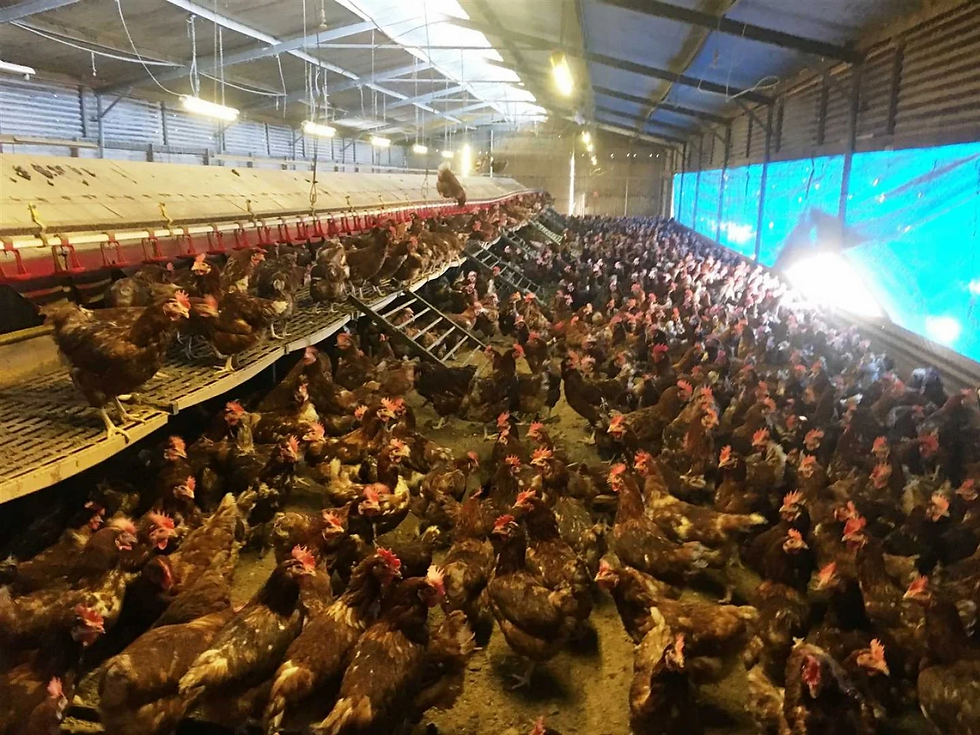Free range vs caged eggs: Is there a nutritional difference?
- Hayleigh Smith

- Aug 16, 2020
- 3 min read
Updated: May 21, 2022
Eggs are a staple in most households and there is many choices at the supermarket such as caged, barn laid, free range and organic. Unlike meats, there is not a huge difference in taste between them, however there is variations on the size and colour of the yolk. Of course there is different ethical concerns which influence peoples choices (and of course price differences). But is there nutritional differences between them? And what should we look out for when buying free range?

The truth behind free range
When picking your eggs, you will find a little declaration on the carton about how many hens they have per hectare. For example, Figure 1 below shows the conditions of the hens that lay most brands of free range eggs which is 10,000 hens per hectare. This is found in both Coles and Woolworths free range eggs. Not what you would imagine free range to be, right?

Below (Figure 2) represents what 1500 hens per hectare would look like, which you can find in some brands of free range eggs such as Sunny Queen and Golden Eggs (found in the supermarket). If you have been buying free range eggs for ethical reasons, this is something you should look out for.

Nutritional considerations
Eggs are an amazing food and are full of nutrients such as being a complete protein source, polyunsaturated and monounsaturated fatty acids, Vitamins A, D, E, and B12, selenium, iron, antioxidants, and the yolk contains choline which is as essential nutrient needed for neurotransmitter synthesis and other very important functions.
But aren't eggs bad?
Just like other animal products, eggs contain cholesterol. Cholesterol is made in our body as the starting material for cell membranes, hormones, helps us digest fat and keeps our metabolism working efficiently. There used to be claims that a high cholesterol diet can increase your risk of heart disease, however there is currently inconsistent evidence regarding cholesterol and heart disease. The heart foundation suggest eggs can be a part of a healthy diet however if you are at risk of heart disease you should limit your intake to up to 7 eggs per week.
Just think of eggs as meat. Fill up your meals with vegetables, healthy grains and add a couple of eggs as your protein source.
Comparison of nutritional content
Specific nutrients
In a 2019 study, free range eggs contained three times the amount of carotenoids (group of antioxidants) compared to caged eggs. (1) Antioxidants remove free radicals in our body which prevents destruction of cells. The reason for this difference is assumed to be the diet that the free range hens are exposed to, such as colourful plants in the field (sources of natural carotenoids). Free range eggs also had significantly greater total fat compared to caged eggs, including omega 3 fatty acids. (2) The greater fat content found in free range eggs is likely due to the hens exposure and therefore consumption of more wild seeds and insects, which are high in fat. Vitamin A, E and cholesterol showed no differences compared to caged eggs.
Photons
Photons are particles of light which can be stored in our food. The greater the capacity the food has to store photons, the more nutritious it is as they are richer in light energy. Eggs from free range hens had eight times more photons than eggs from caged hens which indicates they are richer in biologically active substances. (1)
Limitations of the research
Both studies were done overseas as there is currently no studies done in Australia. Every country has a different breeding system so it may not correlate to our breeding conditions. Although I can imagine they may be quite similar, but what do I know about farming!
There is so many different definitions of free range, as explained above. It does not say in the studies how many hens there were per hectare.
Final words
Although some nutritional benefits observed, buying caged eggs is not going to be your pitfall in your diet by any stretch. Caged eggs are still VERY nutritious and the research is very limited with only two studies found that compared the two that were credible. If you're wanting to buy free range and would like to make sure they are being treated as ethically as possible, look out for the less than 1500 hens per hectare declaration.
References
Gałazka-Czarnecka I, Czarnecki A, Sójka M, Korzeniewska E, Kiełbasa P, Drózdź T. Evaluation of quality of eggs from hens kept in caged and free-range systems using traditional methods and ultra-weak luminescence. Applied Sciences (Switzerland) [Internet]. 2019 Jun 14 [cited 2020 Aug 15];9(12). Available from: https://www.mdpi.com/2076-3417/9/12/2430/htm#
Anderson KE. Comparison of fatty acid, cholesterol, and vitamin A and E composition in eggs from hens housed in conventional cage and range production facilities. Poultry Science [Internet]. 2011 [cited 2020 Aug 15];90(7):1600–8. Available from: https://pubmed.ncbi.nlm.nih.gov/21673178/
To read more about the current position of the Heart Foundation on eggs refer to their website: https://www.heartfoundation.org.au/Heart-health-education/Protein-and-heart-health


Comments